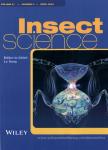Bacterial volatiles elicit differential olfactory responses in insect species from the same and different trophic levels
作者机构:CMPG Laboratory for Process Microbial Ecology and Bioinspirational Management(PME&BIM)Department M2SKU LeuvenLeuvenBelgium Leuven Plant Institute(LPI)KU LeuvenLeuvenBelgium Laboratory of Socioecology and Social EvolutionBiology DepartmentKU LeuvenLeuvenBelgium BiobestWesterloBelgium Lancaster Environment CentreLancaster UniversityLancasterUK Laboratory of Plant Conservation and Population BiologyBiology DepartmentKU LeuvenLeuvenBelgium
出 版 物:《Insect Science》 (昆虫科学(英文版))
年 卷 期:2023年第30卷第5期
页 面:1464-1480页
核心收录:
学科分类:0710[理学-生物学] 07[理学] 09[农学]
基 金:Jetske G. de Boer Agentschap Innoveren en Ondernemen, VLAIO, (HBC.2018.2202) Agentschap Innoveren en Ondernemen, VLAIO Nederlands Instituut voor Ecologie, NIOO
主 题:aphids behavioral response hyperparasitoids parasitoids trophic chain
摘 要:Insect communities consist of species from several trophic levels that have to forage for suitable resources among and within larger patches of *** locate their resources,insects use diverse stimuli,including olfactory,visual,acoustic,tactile and gustatory *** most research has focused on cues derived from plants and other insects,there is mounting evidence that insects also respond to volatile organic compounds(VOCs)emitted by ***,to date little is known about how the olfactory response of insects within and across different trophic levels is affected by bacterial *** this study,we used Y-tube bioassays and chemical analysis of VOCs to assess how VOCs emitted by bacteria affect the olfactory response of insects of the same and different trophic *** were performed using two aphid species(Amphorophora idaei Börner and Myzus persicae *** Blackman),three primary parasitoid species(Aphidius colemani Viereck,*** Haliday,and *** Viereck),and two hyperparasitoid species(Asaphes suspensus Nees and Dendrocerus aphidum Rondani).Olfactory responses were evaluated for three bacterial strains(Bacillus pumilus ST18.16/133,Curtobacterium ***18.16/085,and Staphylococcus saprophyticus ST18.16/160)that were isolated from the habitat of the *** revealed that insects from all trophic levels responded to bacterial volatiles,but olfactory responses varied between and within trophic *** bacteria produced the same set of volatile compounds,but often in different relative *** 11 of these volatiles we found contrasting correlations between their concentration and the behavior of the primary parasitoids and ***,olfactometer experiments on three of these compounds confirmed the contrasting olfactory responses of primary parasitoids and *** potential of these findings for the development of novel semiochemical-based strategies to improve



